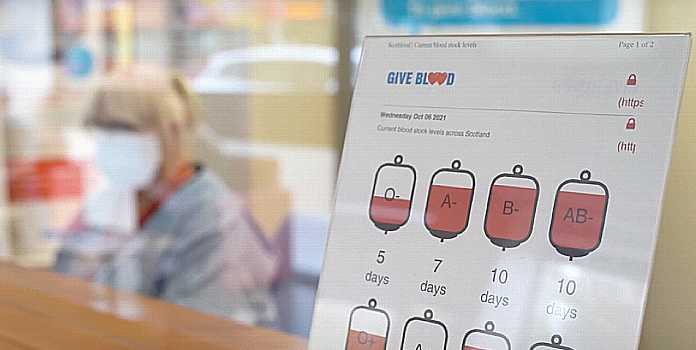(Tony Sifert, Headline USA) Studies and reviews conducted since the early stages of the COVID-19 pandemic have shown that people with the O blood type are less susceptible to viral contagion from COVID-19, and that their symptoms are less severe if they do catch the disease, according to the Mirror.
Men’s Health cited at least seven papers that reveal the link between blood type and COVID-19.
The first, published in March 2020, suggested that “people with Type A blood are more likely to have a severe case of Covid-19.”
A second study from October 2020 showed that the infection had “reduced prevalence … in ABO blood group O,” with those findings confirmed by researchers in China, at Columbia University, the blog 23andMe, and the New England Journal of Medicine.
“A blood-group–specific analysis showed a higher risk in blood group A than in other blood groups and a protective effect in blood group O as compared with other blood groups,” the New England Journal of Medicine reported.
Mark Udden, a professor at the Baylor University’s College of Medicine, told Men’s Health that the results were reliable.
“It’s pretty clear that Type O is protective to some degree,” he said. “I don’t think that having Type A or Type B is the problem—it’s just that they don’t have Type O.”
Udden suggested two possibilities in explanation: either the virus has no “landing strip” in Type O blood, or the A antibodies contained in Type O blood help to fight off the virus even as it remains in your system.
Confirmation of the relation between blood type and COVID comes as the so-called BA.5 subvariant has brought an uptick in new cases—and returned COVID czar Anthony Fauci to national headlines.
In a July 12 press briefing at the White House, Fauci encouraged Americans to get up-to-date on boosters, even though BA.5 bypasses previous vaccination.
“[BA.5] substantially evades neutralizing antibodies induced in people by vaccination and infection,” Fauci said. “But the vaccine effectiveness against severe disease, fortunately for us, is not reduced substantially or at all compared to other Omicron subvariants.”
The Centers for Disease Control and Prevention currently recommends that adults over 50 and others at high risk receive at least two boosters within a four-month span on top of their initial vaccinations. It makes no mention of the different blood-type susceptibility.

